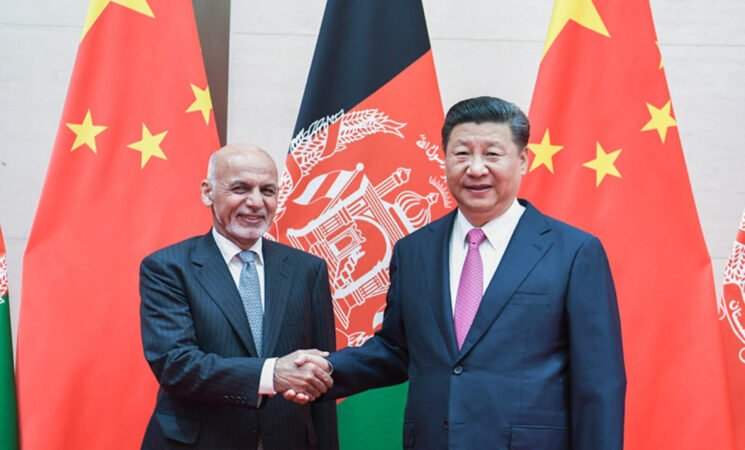23 February 2021, NIICE Commentary 6876
Naseer Ahmad Bhat
Chinese engagements in Afghanistan have been a combination of indifference and of late those of pussy-footed engagement. China is a serious power in the world and is in the vicinity of Afghanistan—country that has often termed as “graveyard of empires”. British have tried their hand in Afghanistan but failed in purists to tame Afghans. Soviet Union also didn’t gain the intended fruits when it meddled in Afghan affairs. Chinese have the advantage of knowing this history, that is why they jeer about it and have quite rightly remained aloof from the politics of Afghanistan. The situation and calculus changes in the backdrop of Doha talks between Taliban and United States. As US is bringing the troop level down, China being the sole major power which has stakes in Afghanistan has lot of homework to do. The Chinese involvement in Afghan affairs can have geo-political repercussions for other South Asian nations particularly India. Of course, Pakistan enjoys the Chinese involvement in Afghanistan but the larger strategic significance of expansionist moves by China will have to be watched for.
Projects Proliferation by China in Afghanistan
Afghanistan has a unique geography which connects it to both South Asia and Central Asia. China has this fact in mind when it invests in Afghan soil. China has the desire to link various markets which can be accessed through Afghanistan. Afghan soil is rich in various rare earth elements like lithium, Iron ore, Copper etc. China is largest foreign investor and the largest trading partner in Afghanistan. It is estimated that China-Afghanistan trade has swelled to USD 544 million in 2017 from initial figures of USD25 million. Both the countries have formed a Sino-Afghan Economic Committee and have signed Comprehensive Cooperative Partnership Agreement in 2006 and 2010 respectively. China has acquired the extraction contract of Mes Aynak Copper field in Logar for USD 4.4 billion and is also working in Amu Darya Basin in Northern Afghanistan for oil exploration. It is also developing extensive railway system in Afghanistan. First rail freight between China and Afghanistan connected the province of Hairatan in Afghanistan to Jiangxi in China. This moment was celebrated with much fervor by Kazakhstan, Uzbekistan, China and Afghanistan. Moreover, China is also planning railroad connectivity between China, Iran, Kyrgyzstan, Tajikistan and Afghanistan.
Convergence of Interests: American and Indian Concerns
American withdrawal from Afghanistan has been put on hold since Joe Biden took over the White house. For sure, Biden would like to review the deal between Taliban and United States. Since India has stakes in Afghan peace, it must be working closely with Afghan government in order to set the deal “right” between Taliban and the US. This can also be gauged from the recent visit of Indian National Security Advisor Ajit Doval to Afghanistan. The statement after the visit by Vice President of Afghanistan Amrullah Saleh talked about concerns regarding common “enemy”. There is also good consensus in American congress about reviewing the deal with Afghanistan. So as Biden consolidates his position, India, Afghanistan Government led by Ashraf Ghani and the US will try to slow the efforts of Taliban in consolidating the power. This goes against the wishes of ‘Iron-friend’ of China which is Pakistan. For China, the US and India are major disruptors for their engagements in Afghanistan. So as India tries to increase engagements in Afghanistan we might see more disruption by China. India might also want the US on its side when it engages with Afghan Government in Kabul.
China’s Uighur and Baloch Separatism
China’s developmental push comes in the backdrop of restive Xinjiang region which sustains a huge Uighur Muslim population and has been at odds with China. The separatism brewing in the region has been given the name of East Turkestan Islamic Movement (ETIM). The US recently has removed ETIM from proscribed militant group list and will not let China off the hook-on Human rights issues in Xinjiang. There is also growing understanding in Washington about the fact whether such organisation even exists or not. ETIM has successfully carried out various attacks against China in Xinjiang region. In order to douse the flare of separatism, China has tried to develop the region and increase investments in Afghanistan. Baloch militants, who are at odds with Pakistani government have successfully targeted various Chinese projects which are part of BRI. China thinks that Baloch militants carry out attack at the behest of India and derail peace process in Afghanistan. This has led to a major confrontationist position between India on one hand and China-Pakistan on the other.
Taliban has given the deadline of May 1 for complete troop withdrawal and it will take lot of effort to convince them to extend this deadline. While US interests in Afghanistan are purely security, China pursues its aims through economic engagements without indulging much in politics of nations. Of late China has started engaging with Taliban on its own terms which was not the case a decade back when Pakistan facilitated the meetings. In lieu of economic investments, Taliban guarantees security for Chinese projects in Afghanistan. But the history from which Taliban comes, there is much to ponder over those guarantees and concerns loom large. The Chinese way of doing things in Afghanistan is that of playing from the shores and don’t get involved in the great game but this shall not be the case for too long. As US withdraws there will be direct confrontations and China will have to make harder choices as it is the only wealthiest neighbor and strongest one in Afghan vicinity. Indeed, the schadenfreude for China will not be there for too long as it sees US pack up.

